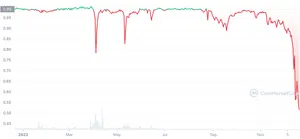Core Scientific is only one of many Bitcoin miners in distress, as low Bitcoin prices and other factors make mining much less profitable. Other mining firms, including Argo Blockchain and Greenidge Generation, have warned that they may face bankruptcy in the near future. Some firms, such as Iris Energy, have powered off a significant amount of their mining capacity.
Core Scientific Bitcoin mining firm files for bankruptcy
Auros files for bankruptcy
Now, however, Auros is seeking a "light touch" liquidation path that would allow them to continue operations while they develop a restructuring plan. Meanwhile, they have missed another Maple loan repayment, this time for $7.5 million.
Court filings have revealed that "a significant proportion of the Company's assets" are frozen with FTX, leaving the company insolvent. These assets have an estimated value of $20 million.
Waves founder announces a new, "undepeggable" stablecoin as USDN even more dramatically de-pegs
The USDN stablecoin remained within a few cents of its intended USD peg for about a year, before losing its peg in April. Since then, it has had a pretty bumpy road, spending much of the year more than a few cents off the dollar peg, and dropping much farther below it in early November.
A less-than-enthused commenter responded to Ivanov's Twitter announcement of a new coin, writing, "My brother in Christ more stablecoins to depeg is not the answer". "It will be undepeggable", replied Ivanov. Well, in that case.
Scammer steals fourteen Bored Apes from one victim, flips them for over $1 million
After some back-and-forth, with legitimate-looking contracts and falsified emails appearing to come from the real company's real founding director, the NFT collector was asked to use their crypto wallet to sign a contract, via the fake company partner website that had been set up.
When the collector did so, the smart contract drained the collector's wallet of its fourteen pricey Bored Ape NFTs, then accepted the highest offers that were outstanding on each of the Bored Apes, netting 852.9 ETH. The scammer converted the stolen ETH to the DAI stablecoin, making off with $1,075,000 in DAI.
Over 100 Bitcoin moved from dormant QuadrigaCX wallets in "unauthorized" transfer
Now, someone has moved 104 BTC (priced at $1.75 million today) from what is supposed to be a Quadriga cold wallet. In 2019, Quadriga's bankruptcy trustee Ernst & Young revealed they had erroneously transferred these roughly 100 Bitcoin to that wallet, which they could not access. Oops.
Most of the stolen BTC was transferred to a privacy service to obfuscate its ultimate destination. Ernst & Young subsequently confirmed the transfers were "unauthorized transactions" and not performed by them.
- "QuadrigaCX Has Had an Improbable Week", CoinDesk
Raydium exploit results in ~$5 million loss
Raydium claims the exploit was a trojan attack, though they've provided no further evidence to substantiate this. According to Raydium, a trojan allowed an attacker to compromise the private key belonging to the pool owner account. With control over the private key, the attacker was able to withdraw a mix of assets from the pools. They bridged at least $2 million to Ethereum and tumbled them through Tornado Cash; another $1.5 million remained on the Solana chain, where some projects began freezing assets.
Raydium has offered a 10% "bug bounty" to the hacker if they return the stolen funds.
Auditing firm cuts ties with crypto clients, deletes Binance's "proof of reserves" report they issued days prior
On December 7, a branch of Mazars Group had published a "proof of reserves" report for Binance — though it only accounted for Bitcoin, and did not reflect liabilities for Binance's lending product. On December 9, Crypto.com also published a "proof of reserves" report that had been produced by the firm.
As of December 16, the Binance audit — which had been hosted on Mazar's website — had been deleted.
"Proof of reserves" reports have been offered by various cryptocurrency exchanges in lieu of proper audits, but have reasonably failed to reassure many customers of those exchanges. These reports do not involve the scrutiny that would be applied by a full audit — they only reflect a snapshot of assets at a point in time, and do not show a firm's liabilities.
Donald Trump teases a "major announcement" that's just NFTs
Trump supporters got all excited when Trump posted on social media to tease a "major announcement". Was he going to run for speaker of the House? Return to Twitter? Unveil a presidential running mate?
His supporters were surprised — and not exactly thrilled — when the announcement turned out to be a collection of 45,000 NFTs (sorry, "digital trading cards") featuring artwork of himself in heroic outfits and poses. The NFTs are "just" $99 apiece, and money goes to Trump, not his campaign.
Even some of his strongest supporters were nonplussed. Steve Bannon said, "I can't do this anymore," and opined that he should fire whoever advised him to make the collection. A source working for Trump said that he is "supposed to be running for president right now", and questioned how "fleecing our supporters for $99" was in service of that goal.
Nevertheless, the NFTs seemed to sell decently well, with more than 30,000 minted by that evening.
Binance withdrawals surge due to concerns over the company's reserves
These mass withdrawals signal concerns about Binance, whose users are looking for reassurance that the company is not engaged in similarly shady practices as their now bankrupt rival FTX. Recent news that the US Department of Justice is considering criminal charges against the company has not helped reassure customers.









